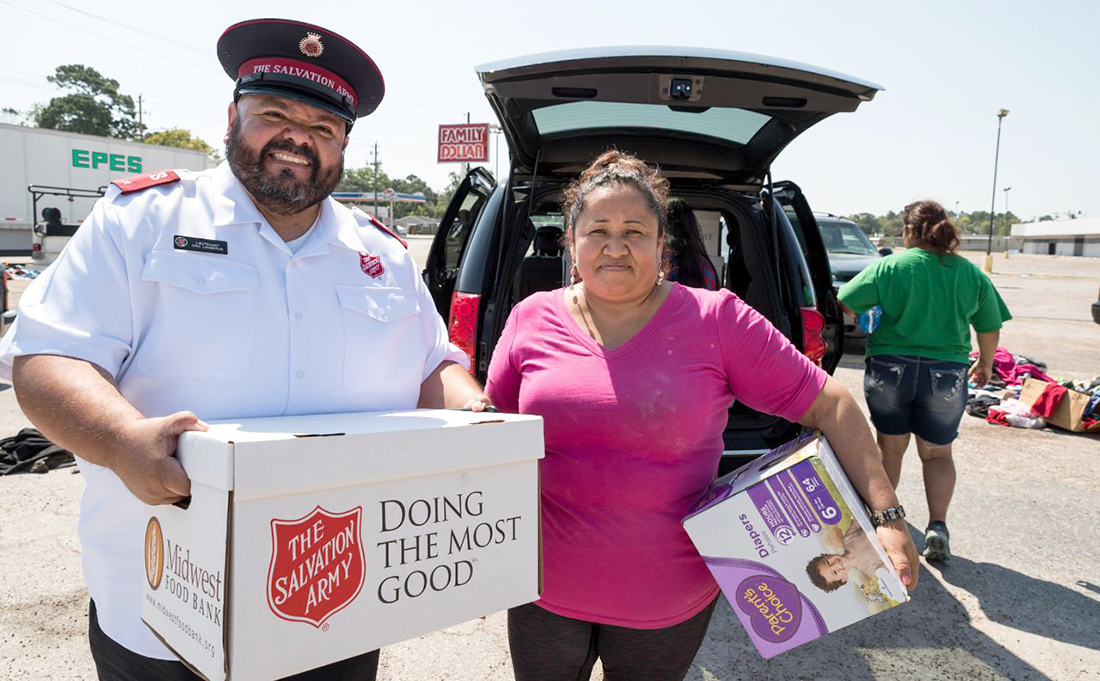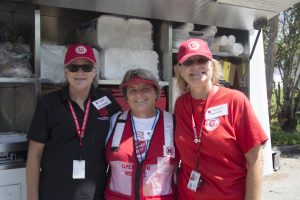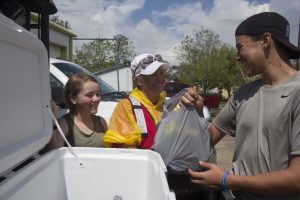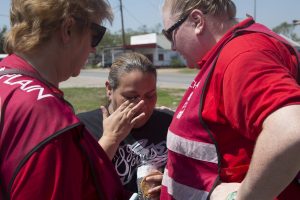Tales from the Front Lines: Jackie's Story

This blog is part of a series focusing on staff, officers and volunteers who have served hurricane relief efforts in Texas, Florida and Puerto Rico. Jackie Rachev is the communications manager for the Metropolitan Division.
When Hurricane Harvey hit Texas August 25, and it was determined the damage was going to be worse than originally expected, I informed my supervisors that I was interested in serving in Texas if the request came in. My offer was met with general appreciation and I was told I would probably go in the end of September or October if the need was there. After all, there were many other divisions closer to Texas and many people who were much more experienced than I.
Fast forward to September 2. I was notified by the emergency services director that I would be deploying to Texas that Thursday, and I would be serving on the Incident Command Team as the Public Information Officer (PIO). I would be responsible for telling stories, capturing photos and disseminating our information to the community. I thanked the director and hung up the phone. I sat there in silence for a moment and then the flood of emotions started: Empowerment. Excitement. Nervousness. Uncertainty. Fear. Gratitude. It all came rushing in and it didn't stop. I was being trusted to serve in a capacity that would tell our stories - our clients' stories - in a gentle, respectful and powerful way. For a communication's professional, that's a lot to take in. It's a high level of trust.

Volunteers from Granbury, TX with their mobile feeding unit.
At the airport, I got out the car and said goodbye to my husband. As he pulled away, the tears started to fall. I knew I was going to help others, but I was leaving the comfort and predictability of my life. I was never going to be the same. The nervousness stayed with me until I arrived at my new home base in Victoria, Texas, approximately 2.5 hours southwest of San Antonio.
My deployment was 16 days. For more than two weeks, I served alongside a seasoned group of disaster workers from the Chicago-area, Indiana, Michigan and North Dakota. I was clearly the newbie in the group and I did everything I could to suck up the knowledge they so willingly shared with me.
As PIO, I had the opportunity to go into the field with our canteen workers and emotional and spiritual care teams. That is where I learned the most. Salvation Army emergency disaster volunteers are some of the most dedicated and loving people I have ever met. At the drop of a hat, they willingly leave their homes and families to come to the aid of others. One volunteer spent her birthday tending to the emotional needs of others rather than at her home with a special dinner, cake and gifts. Instead, she was serving in heat and humidity, bringing compassion, food, water and so much more to people who lost everything.
I met clients who, in the face of utter devastation, welcomed friends, neighbors and strangers alike with a smile, kind word, and a handshake or a hug. And when they saw people from The Salvation Army, they asked how we were doing. And thanked us for coming from so far away. "You guys are far from home. We really appreciate your work," was often heard. For many, a warm meal and a cold bottle of water or Gatorade was a short respite from the grueling work of cleaning out their homes and starting the process of documenting the damage.
 When I was preparing to be deployed, I readied myself to see crazy levels of damage - piles and piles of ruined furniture and personal items on the road for miles. But in my area, that wasn't the case. Sure, there was a lot of damage, but it was mostly wind damage with water damage being secondary. Compounding the tragedy of the hurricane was the fact that the area I served was very poor. Most residents were living paycheck to paycheck before Harvey struck. Whatever savings they might have had were gone by the time I got there, and they were at a loss as to what to do next. Their homes were damaged, they weren't back to work yet and they had no money left. So the food boxes, diapers, water and other supplies we could give them were lifesavers.
When I was preparing to be deployed, I readied myself to see crazy levels of damage - piles and piles of ruined furniture and personal items on the road for miles. But in my area, that wasn't the case. Sure, there was a lot of damage, but it was mostly wind damage with water damage being secondary. Compounding the tragedy of the hurricane was the fact that the area I served was very poor. Most residents were living paycheck to paycheck before Harvey struck. Whatever savings they might have had were gone by the time I got there, and they were at a loss as to what to do next. Their homes were damaged, they weren't back to work yet and they had no money left. So the food boxes, diapers, water and other supplies we could give them were lifesavers.
Every time I met with a client or spoke with a resident while picking up supplies, I was thanked for my work. It was so strange to me because I wasn't actually doing the work that was so important. I didn't prepare the food. I wasn't on the canteens or offering prayers. I was just there collecting stories and taking photos and then sharing those with the world. When I shared that thought with our Incident Commander, Jim, he reminded me that while survivors appreciate the hot dog you're giving them, they appreciate the fact that you came down to Texas to give them that hot dog. Its called the ministry of presence. That is what I offered people - my time, my presence. I gave them power to tell their story. They could share their devastation and the triumph over it. They could shout to the world that they are strong. Texas Strong.

Chaplains from Milwaukee offer prayers and support to a local resident.
When I came home, I had a deeper appreciation for my life, and those in it. I was more tenderhearted and much more willing to give grace and mercy. Priorities have shifted.
Whenever I can, I remind people that the work of recovery and rebuilding has only begun, and urge them not to forget about survivors. I keep track of the efforts through several Facebook pages, and cheer when they move to the next step of recovery. It will take many years (maybe even a decade) to get back to "normal," but I know they will. And I'll cherish my little part in getting them there.
